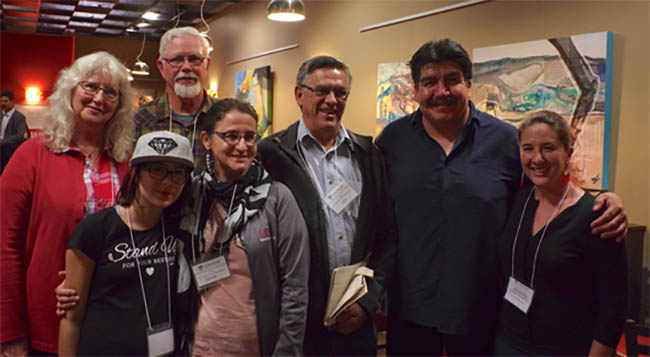Future discussed at Boreal Heartbeat climate change forum

By Rick Garrick
THUNDER BAY – Red Rock Indian Band’s Tom Morriseau Borg and Biigtigong Nishnaabeg’s John Twance recently described some of the climate changes they are experiencing at Lakehead University’s Climate Change Forum. They were among about 29 citizens from communities along the north shore of Lake Superior who participated in Kelsey Jones-Casey’s Boreal Heartbeat: Emotional Impacts of Climate Change in Northwestern Ontario research project.
“It’s affecting me quite a bit because I’m on the land all the time (and experiencing) the changes in the work now due to the high winds and the weather extremes,” Borg says. “Growing up, I used to go cut holes through the ice for water to sustain ourselves. And today I don’t walk out on those waters — there’s no ice there anymore like there used to be.”
Borg says new species of animals are also coming into the area due to the changing climate.
“I feel (future generations) are not going to be able to experience a lot of the things we have taken for granted over the years, what the Creator has provided for us,” Borg says. “With the changes coming for them, a lot of these species are going to move north (and) a lot of the plants and medicines and foods that we have are disappearing on us.”
Twance says it is important to provide more information to community members about the changing climate in the region.
“I was really happy about expressing my observations of what has been happening with climate change, being a land user for the past 30-plus years,” Twance says. “I’ve seen some changes, like the hunt has been a lot later with the warmer, longer falls we’ve been having. It’s having somewhat of an impact on the moose hunt — they’re not really rutting like they’re supposed to be. And with trapping and a lot of other land-use activities, you have to be getting your animals out of the bush quicker in the fall because you don’t want any spoilage.”
Twance says people now have to be more careful about what they harvest from the land.
“I teach my sons: ‘If you take a moose you share it among two-or-three families,’” Twance says. “The feeling is just as good to let one walk away as it is to shoot one. It actually feels better to let that moose walk away.”
Jones-Casey, a Fulbright Scholar fellow, conducted the Boreal Heartbeat research project over the past six months. She says it was an honour to meet many different people from all over the region. Her research project includes photos of each of the research participants holding up a sign with a word or phrase about climate change. Their photos and information about the project are posted online at: www.borealheartbeat.org.
“Everyone had their own sign that was a word or a phrase that described the emotion that they experienced when they thought about climate change and its impacts,” Jones-Casey says. “It was very powerful for me to see and I think it helped change some of my perceptions about how impactful climate change is. I hope that is true for other people too.”
The Climate Change Forum, held Sept. 28-29 at Lakehead University, featured a variety of presentations and panel discussions on climate change, a guided tour of EarthCare Thunder Bay and Lakehead University’s Collaborative photovoice exhibit on climate change and a student/faculty debate on: Humans are rising to the challenge and tackling the climate change crisis.


